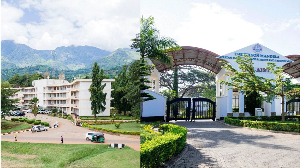Accra, June 18, GNA - The Friends of the Earth-Ghana on Monday appealed to government to recognise the links between the current energy crisis, the problems of desertification and climate change and the toll they take on national and local economies and take steps to address the problems.
"We implore the government to be concerned and to take practical actions at the local level such as environmental conservation, restoration and rehabilitation, and training for local communities in alternative sustainable livelihood activities in order to mitigate the effects of desertification and climate change that have engulfed the country".
This was contained in a statement on Monday signed by Mr. Theo Anderson, Director, Friends of the Earth-Ghana to commemorate this year's United Nations Day to combat desertification and drought which fell on Sunday June 17.
The day has been set aside by the UN under the auspices of the United Nations Convention to Combat Desertification (UNCCD) to create awareness on the causes and impacts of desertification on people and the environment and to highlight possible solutions. The theme for this year's celebration was: "Deserts and Climate change," which was also meant to bring hope to the affected communities and to strengthen the visibility and importance of desert issues on the agenda of nations and on the international community at large. "The current energy crisis in the country is one of the ripple effects of the lack of political will of the government to show real commitment to dealing with the threats of desertification and climate change," the statement said.
"We are also dismayed at the lack of action that continues to prevail around the use and implementation of action programmes to combat desertification and climate change which have been agreed and put in place for several years".
It said despite the fact that adequate knowledge about the impact of desertification had long been identified and made available by relevant stakeholders to government, the respond was not encouraging. It is estimated that 35 per cent of the total land area of Ghana was seriously threatened by desertification and a further 20,000 hectares of savannah land were subjected to desertification each year. The savannah zones of the Northern, Upper East and Upper West are the worst affected while the South-eastern coastal belt is also under threat.
The statement said unfavourable climate conditions of long drought and short rainfall seasons in the affected areas coupled with unsustainable human activities such as indiscriminate bush burning, poor farming practices and lack of awareness were the main causes of desertification in Ghana. These were affecting agricultural productivity, water availability and quality, rural wood fuel accessibility leading to miserable living conditions which had also contributed to the migration of the youth to the urban centres to seek alternative livelihood opportunities. 18 June 07
General News of Monday, 18 June 2007
Source: GNA












